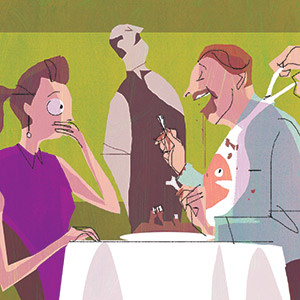The end of the affair
Roula Khalaf, Editor of the FT, selects her favourite stories in this weekly newsletter.
Food must have been part of human mating rituals since the very beginning. Long before we even had the speech to chat each other up, the size of the lump of food you could offer a potential partner must have been a useful indicator of your suitability as a mate.
But the way we eat is changing. Perhaps I’m getting old … perhaps I have passed my breeding peak but I wouldn’t want to be dating on the current restaurant scene and I despair for those poor souls who are.
We have come a long way since we needed to woo with a hunk of freshly slain antelope but the principle has persisted. According to The Iliad, the Greeks were very hot on grilling lamb, and if Achilles didn’t seduce Patroclus over a kebab I’d be surprised. If legend and medieval history are to be believed, courtly love could be expressed through courtly lunch. The verray, parfit, gentil knyght was expected to bring home a unicorn or at the very least a panting hart and, though the historical record is muddy on the subject, it’s fair to assume he had enough social graces to sling it on the barbie before presenting it to his lady. Nell Gwyn is supposed to have won her king with an ample display of fruit, and Jane Austen’s heroines could work their charm on anyone yet unaware they were in want of a wife by decorous plying of the teapot.

We shouldn’t wonder at this. Sharing food is an opportunity to display generosity, a willingness and an ability to provide. It shows a desire to nourish, nurture and protect. More recently, restaurants and public eating places have provided a stage for the display of manners, refinement, wealth and much, much more. Stick your suitor on the opposite side of the tablecloth, arm them with knife and fork and watch them reveal everything.
Eating, like sex, is one of the basic human needs we can, if we wish, take pleasure in. A fair face, a pleasing wit and a well-wrought frame are all very promising but by no means a guarantee of pleasure. Watching, on the other hand, as your intended strips the meat from a steamed artichoke leaf with strong white teeth … well, you can pretty much take that to the bank. Anyone who can balance greed, satiety, ecstasy and messiness with the starter is … you can fill in your own blanks.
And it’s here that I pause, worried, really, at the future of our species. I think back over the restaurants I’ve enjoyed in the past few years and wonder how the hell our children’s generation are ever going to get together over the food they’ll grow up with.
It’s part of my job description occasionally to eat alone and I’ve often noticed couples, clearly on dates, explaining their dietary restrictions to a baffled waiter. I used to avoid garlic on dates – it seemed polite – and discreetly check my teeth for spinach bits in forays to the gents. But if I’d had to sit opposite someone and discuss with the floor staff which ingredients might cause me intestinal discomfort or a disfiguring skin rash, I think I’d have died of mortification.
When the food arrives, it is now even less conducive to love. Discussing how the microgreens were sustainably foraged and how the fish-lip foam was poached for a week at 71.9C tells your date to call a lawyer and take out some sort of injunction that stops you going within 500m of them or a Michelin-starred restaurant for as long as you both shall live.
Even going informal won’t help – nothing could be less romantic than “dude food”. I fondly hope there are people out there who would not be physically sickened by the sight of me wolfing down a double portion of Uncle Bubba’s Extra Hot Deep Fried an’ BBQed Hawg Racks™ … but they are few and, to be frank, a bit odd.
I wonder sometimes if this isn’t some kind of awful Darwinism at play. Perhaps nature is selecting those strong creatures with simple tastes and a robust joy in the pleasures of life.
I wonder if those of us who can afford haute cuisine, who are picky about our food or who indulge in testosterone-seasoned overeating are somehow too weak-minded and decadent – unworthy to perpetuate our genes.
Tim Hayward is an FT Weekend contributing writer; tim.hayward@ft.com; Twitter @TimHayward
Illustration by Richard Allen
Comments